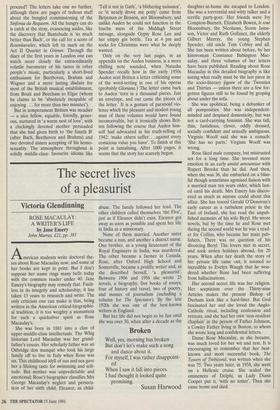The secret lives of a pleasurist
Victoria Glendinning
ROSE MACAULAY: A WRITER'S LIFE by Jane Emery John Murray, 121, pp. 381 American students write doctoral the- ses about Rose Macaulay now, and some of her books are kept in print. But I don't suppose her name rings many bells today with the common reader under 40. Jane Emery's biography may remedy that. Fault- less in its integrity and scholarship, it has taken 13 years to research and write. The only criticism one can make is that, being written in the American critical-biographic- al tradition, it is too weighty a monument for such a quicksilver spirit as Rose Macaulay's.
She was born in 1881 into a clan of upper-middle-class intellectuals. The Whig historian Lord Macaulay was her grand- father's cousin. Her scholarly father was an Oxbridge don manqué who took his large family off to live in Italy when Rose was six. This childhood idyll of sun and sea gave her a lifelong taste for swimming and soli- tude. But mother was unpredictable and emotional; Rose's biographer classifies Mrs George Macaulay's neglect and persecu- tion of her sixth child, Eleanor, as child-
abuse. The family followed her lead. The other children called themselves 'the Five', just as if Eleanor didn't exist. Eleanor got away as soon as possible and spent her life in India as a missionary.
None of them married. Another sister became a nun, and another a district nurse. One brother, as a young lieutenant of the Royal Engineers in India, was murdered. The other became a farmer in Canada. Rose, after Oxford High School and Somerville, became a prolific writer and, as she described herself, 'a pleasurist'. Between 1906 and 1956 she wrote 23 novels, a biography, five books of essays, four of history and travel, two of poetry, and masses of journalism (including a column for The Spectator). By the late 1920s she was one of the best-known writers in England.
But her life did not begin to be fun until she was over 30, when after a decade as the
daughter-at-home she escaped to London. She was a torrrential and witty talker and a terrific party-goer. Her friends were Ivy Compton-Burnett, Elizabeth Bowen, le tout Bloomsbury, the Nicolsons, Storm Jame- son, Victor and Ruth Gollancz, the elderly Gilbert Murray, the young Stephen Spender, old uncle Tom Cobley and all. She has been written about before, by her kinswoman Constance Babington Mac- aulay, and three volumes of her letters 'have been published. Reading about Rose Macaulay in this detailed biography is like seeing what really must be the last piece in the socio-literary jigsaw of the Twenties and Thirties — unless there are a few for- gotten figures still to be found by groping about under the sofa.
She was apolitical, being a debunker of all pomposities. She was independent- minded and despised domesticity, but was not a card-carrying feminist. She was tall, thin, fastidious, clever, oddly dressed, socially confident and sexually ambiguous. Virginia Woolf said she was a eunuch: 'She has no parts.' Virginia Woolf was wrong.
Rose liked male company, but mistrusted sex for a long time. She invested more emotion in an early amide amoureuse with Rupert Brooke than he did. And then, when she was 36, she embarked on a bliss- ful though sometimes agonised liaison with a married man ten years older, which last- ed until his death. Mrs Emery has discov- ered as much as anyone could about this affair. She has traced Gerald O'Donovan's early career as a turbulent priest in the East of Ireland, she has read the unpub- lished memoirs of his wife Beryl. He wrote novels, but by the time he and Rose met during the second world war he was a read- er for Collins, who became her main pub- lishers. There was no question of his divorcing Beryl. The lovers met in secret, and took stolen holidays abroad, for 20 years. When after her death the story of her private life came out, it seemed so incredible to Evelyn Waugh that he won- dered whether Rose had been suffering from hallucinations.
Her second secret life was her religion. Her scepticism over the Thirty-nine Articles makes the present Bishop of Durham look like a hard-liner. But God fascinated her and she loved the Anglo- Catholic ritual, including confession and retreats, and she had her own 'non-resident chaplain' in the person of Father Johnson, a Cowley Father living in Boston, to whom she wrote long and confidential letters.
Dame Rose Macaulay, as she became, was much loved for her wit and zest. It is encouraging to remember that her best- known and most successful book, The Towers of Trebizond, was written when she was 75. Two years later, in 1958, she went on a Hellenic cruise. She scaled the eminences of Delphi, as Lady Diana Cooper put it, 'with no totter'. Then she came home and died.


















































 Previous page
Previous page